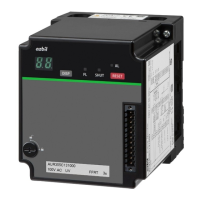7
Chapter 4. Communication
4 - 1 Overview of Communication
Communication procedure
The simplest way to describe the communication procedure is as follows.
1. The master station sends a command message to the specified slave station.
2. The slave station processes the message, which is a command to read or write data.
3. Additionally, the slave station sends a response message whose contents
correspond to the type of processing.
4. The master station receives and processes the response.
Message structure
The following shows the message structure.
Messages are broadly classified into two layers: the data link layer and the
application layer.
• Data link layer
This layer contains the basic information required for communication. For
example, it has the destination of the command message and the checksum
information.
• Application layer
Data is read and written in this layer. The content of the layer varies according to
the purpose of the message.
Messages include parts 1 to 9 in the figure below.
The command in a command message from the master station and the response in
a response message from the slave station are stored in the application layer.
Data link layer
z
Overview
The data link layer has a fixed length. The relative position of each item of data
and its length are prescribed. Note, however, that the position of data in the data
link layer from ETX onwards shifts according to the number of characters in the
application layer. The length of the data link layer text remains unchanged.
02H
58H30H30H 0DH03H
STX
X00 ETX
0AH
CR LF
Data link layer Application layer Data link layer
1 frame
STX (start of message)
Device address
Subaddress (xed at “00”)
Device code
In command message = the command, in response message = the response
ETX (end of command or response)
Checksum
CR (delimiter)
LF (delimiter)
1 2 3 4 5 6 7 8 9
1
2
3
4
5
6
7
8
9

